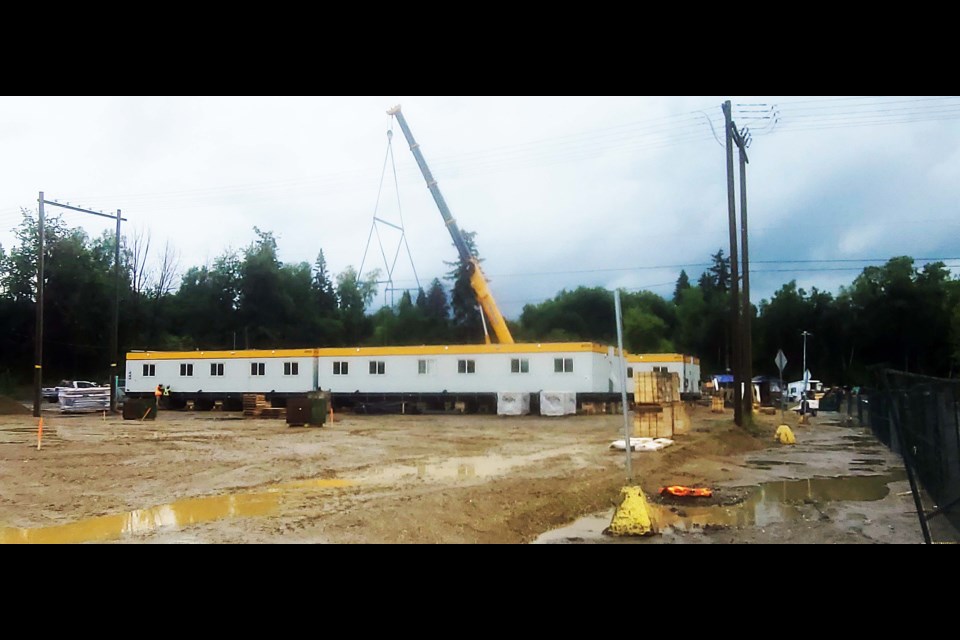A huge crane has been in place all week and much of the heavy lifting has already been done to establish a 43-room Homeless Encampment Action Response Temporary Housing (HEARTH) transitional shelter facility near downtown Prince George.
By Friday morning seven of the eight Atco trailers that will make up the modular camp at 397 Third Ave. were in place and workers are on the site preparing them for occupancy sometime this fall.
Built on a three-year temporary use permit provided by the city, the housing facility is the product of a memorandum of understanding which formalizes a commitment from the province, B.C. Housing and city of Prince George to better support homeless people and prevent encampments from being established.
It will allow city staff to eventually close the adjacent Moccasin Flats encampment along Lower Patricia Boulevard.
According to information requested by The Citizen from B.C. Housing, each trailer will contain two units on either side of a shared washroom and once the camp setup is complete there will be 43 private rooms, two of which will be wheelchair accessible. The site will also include an amenity trailer with a dining area and commercial kitchen, office space, a meeting room and a designated smoking area.
The provincial government is providing B.C. Housing $4.1 million in funding to establish the camp. City council approved $468,000 in funding to pay for sewer/water hookups and raise the ground level of the camp, which is being built on a flood plain.
To ensure the health and security of residents and the community the site will be fully fenced with controlled access and security cameras. The trailers are all equipped with a sprinkler system and all residents will have the protection afforded by fire alarms, smoke detectors and fire extinguishers.
The low-barrier housing will be made available to people who have a varying degree of needs and the transitional facility meets the government’s Housing First mandate which emphasizes housing as a basic need that provides the stability and safety needed for individuals to rebuild their lives.
Residents will pay rent and be required to sign an agreement that outlines their responsibilities. However, it will not be considered a rental agreement because the units are considered transitional housing.
Through a procurement process B.C. Housing will select an experienced non-profit operator to manage the camp and offer the residents such services as: daily meals, laundry/shower facilities, 24/7 on-site staff support, healthcare referrals/wellness checks and connections or referrals to community services and support groups.
Residents will be allowed to have guests but they will be subject to following defined visitor policies.
City staff will continue working this summer to shore up fencing that will clearly outline the boundaries of Moccasin Flats to deter illegal dumping and will conduct ongoing efforts to clean up the site and improve living conditions. The city is removing the remnants of camp shelters that have caught fire and burned to reduce hazards for the residents.
The city has also committed to coordinating its efforts with partner agencies through the Community Safety Hub and staff will review sites for consideration for city council to determine where temporary overnight sheltering will be allowed.
Work crews will be on the site working seven-day weeks from 7 a.m.-5 p.m. until the facility is built. B.C. Housing has sent a letter to neighbouring businesses providing details of the construction project.
More information about the project is available online.



